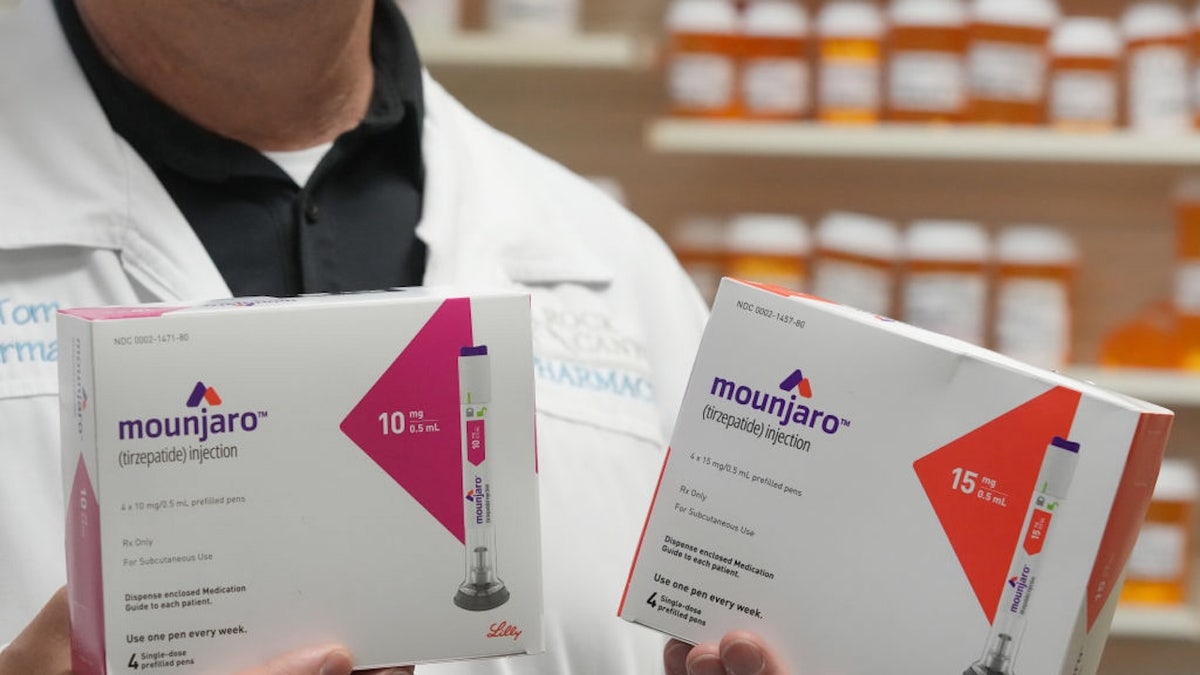Ozempic, the happy drug? Study suggests weight-loss medications could reduce depression, anxiety
For the millions of people who take Ozempic and Wegovy, weight loss is the best-known outcome — but a new study suggests the medications could also help squash depression.
Investigators from Epic Research, a health analytics firm based in Verona, Wisconsin, found that patients with diabetes who were prescribed glucagon-like peptide-1 receptor agonist (GLP-1) medications were less likely to develop depression compared to people who are not taking the drugs.
GLP-1 medications include semaglutide (Ozempic or Wegovy), tirzepatide (Mounjaro), dulaglutide (Trulicity) and exenatide (Byetta and Bydureon).
OZEMPIC, OTHER WEIGHT-LOSS DRUGS MAY STRENGTHEN NEW YEAR’S RESOLUTIONS, EXPERTS SAY: HEALTH GOAL ‘BOOST’
“The likelihood of anxiety in diabetic patients is lower for those on all five GLP-1 medications studied,” the researchers wrote in a release on Epic’s website.
For those without diabetes, semaglutide was linked to a lower likelihood of depression and anxiety, while liraglutide did not show any statistically significant benefit.
The study analyzed the GLP-1 medications and mental health diagnoses of 3,081,254 diabetic patients and 929,174 non-diabetic patients.
Dr. Brett Osborn, a Florida neurologist and founder of the longevity company Senolytix, was not surprised to hear of the Epic Research study findings.
OZEMPIC AND WEGOVY OVERDOSE CALLS HAVE SPIKED, EXPERTS SAY — HERE’S WHAT TO KNOW ABOUT DANGEROUS DOSES
“Ozempic’s potential antidepressive effects are garnering interest, both from the scientific community and those seeking holistic ways to manage their mental health alongside physical conditions,” he told Fox News Digital.
Weight loss often leads to a boost in mood and overall outlook in Osborn’s patients, he noted.

“Losing weight can significantly impact an individual’s self-esteem and overall mood, leading to a more positive outlook on life,” the doctor said.
“The confidence boost that comes with achieving weight loss goals can be transformative, reducing feelings of depression and enhancing mental well-being.”
OZEMPIC AND WEGOVY COULD LEAD TO MUSCLE LOSS, EXPERTS SAY, BUT PREVENTION IS POSSIBLE
Dr. Jennifer Bourgeois, PharmD, a Dallas-based pharmacy and health expert with SingleCare, a prescription discount service, said none of the companies that produce GLP-1 medications studied the effect on depression in the original clinical trials.
“At this time, none of the GLP-1 medications used to improve glycemic control in adults with type 2 diabetes or in chronic weight management claim to curb depression and anxiety,” she told Fox News Digital.
That doesn’t mean it’s not possible, however, the expert said.
Physical and mental mood-lifters
In previous research, Ozempic and other GLP-1 drugs were shown to have antidepressant-like effects in diabetic mice with type 2 diabetes, suggesting that the drugs have direct effects on brain chemistry and connectivity, Osborn said.
“It is thought that this results from GLP-1’s influence on the release of neurotransmitters, such as norepinephrine and serotonin, in a deep brain region known as the hypothalamus,” Osborn said.

GLP-1 drugs also modify the release of dopamine in the amygdala, the “emotional center” of the brain, Osborn said, which is involved in mood regulation.
While Bourgeois agrees that these medications may impact mood via brain changes, she said the likelier reason for the reduced depression and anxiety is the positive mental and physical health effects of weight loss.
OZEMPIC AND WEGOVY WEIGHT LOSS DRUGS COULD HELP REDUCE ALCOHOL USE DISORDER SYMPTOMS, STUDY SUGGESTS
Weight loss induced by GLP-1 medications triggers biological changes that positively impact mood regulation, Bourgeois said.
“As excess adipose tissue (body fat) decreases, the production of inflammatory cytokines reduces, leading to a decrease in systemic inflammation,” she said.
“Research suggests that chronic inflammation may disrupt neurotransmitters like serotonin and dopamine as well as the balance of gut bacteria, potentially leading to mood imbalances.”

The boost to self-esteem and body image can also curb depression and anxiety, Bourgeois noted, leading to an overall more positive outlook.
“Individuals who achieve weight loss through GLP-1 receptor agonists may experience a sense of accomplishment and empowerment, which can positively influence their mental health,” she said.
There may also be a “trickle-down” effect, with weight loss often leading people to adopt healthier lifestyle habits — such as regular exercise and improved dietary choices, the expert pointed out.
“These lifestyle changes can have profound effects on mental health,” she said.

“Physical activity is known to stimulate the release of endorphins, which promote feelings of happiness and euphoria, and a nutrient-rich diet can provide essential vitamins and minerals that support brain function and mood regulation.”
More research needed
While the Epic data is “promising,” said Bourgeois, “more research is needed to determine if the medication itself is responsible for the reduction in depression and anxiety diagnoses.”
CLICK HERE TO SIGN UP FOR OUR HEALTH NEWSLETTER
“Other factors like physical activity, diet and sleep were not controlled and could be contributing to the mood-altering effects.”
Osborn added, “I’m not saying that Ozempic will become a first-line treatment for depression, but it certainly highlights the interconnectedness of physical and mental health.”
For more Health articles, visit www.foxnews.com/health.
Read the full article Here


